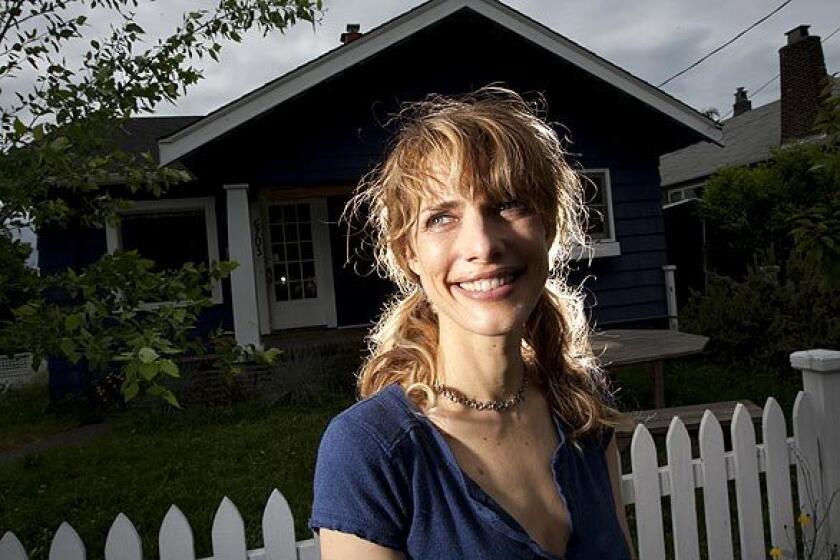Appreciation: Lynn Shelton, director of ‘Humpday’ and ‘Sword of Trust,’ found beauty in human imperfection
One of the most wrenching scenes I saw in any movie last year arrives a few minutes into “Sword of Trust,” the eighth independent feature written and directed by Lynn Shelton.
It begins with a woman, Deirdre (played by Shelton herself), strolling into an Alabama pawnshop, flashing a big, twitchy smile and radiating nervous energy. The owner, Mel, receives her in stony silence, and their awkward, lopsided conversation lays bare a painful shared history. After some strained small talk, Deirdre tries to pawn a piece of jewelry, chattering on about how great she’s doing in her new job and how she just needs some money to get her car fixed. Mel isn’t having it, and before long his refusals have reduced Deirdre’s desperate pleas to a quiet murmur: “It’s not what you think,” she says, her eyes barely meeting his. “It’s not what you think.”
And now, the unthinkable. None of us could have guessed at the time that “Sword of Trust” would be the last picture Shelton would ever make, or that Deirdre — who in one six-minute scene manages to convey a longtime struggle with addiction and loss — would be the last character she would ever play. Shelton, who died Friday at age 54 of an undetected blood disorder, was a director who loved actors and an actor who sometimes appeared in other directors’ movies, but she rarely appeared in her own. That she made an exception this time felt like a gift then and feels like even more of a gift now. The poignancy is made even more unbearable by the fact that Mel is played — beautifully — by Marc Maron, Shelton’s romantic partner and frequent collaborator, with whom she was writing a new movie.
Over a film career typified by formally modest, emotionally perceptive relationship studies like “Humpday,” “Your Sister’s Sister” and “Outside In,” Shelton gave us a lot of chatty, unfiltered types like Deirdre, characters whose thoughts and feelings came pouring out in restless, alternately delightful and infuriating waves. She was a master of the tetchy and the loquacious, a deft orchestrator of blurted revelations and frayed nerve endings, which is all the more remarkable considering how often she encouraged her actors to improvise. Her less obvious talent was for teasing out the unexpressed feeling behind all those words: Again and again she found the resonance in what her characters weren’t saying, in what they were trying to hide.
That talent was especially apparent in her 2009 Sundance Film Festival breakthrough, “Humpday,” her third feature (after “We Go Way Back” and “My Effortless Brilliance”) and still one of her best and best-known films. A visually and verbally kinetic comedy about two straight best friends (played by Mark Duplass and Joshua Leonard) who challenge themselves to star in their own gay pornographic film, the movie tenderly but ruthlessly dismantles its characters’ insecurities — and the audience’s as well. Set in Seattle, where Shelton grew up, it satirizes the thinly veiled homophobia that can surface even in male-dominated enclaves that pride themselves on their liberalism, mainstream Hollywood very much included.
Lynn Shelton: The female Judd Apatow?
“Humpday” was a perfectly imperfect example of Shelton’s knack for making movies that were both rough-hewn and fine-grained, and for locating uproarious, often preposterous comic situations in everyday reality. Like a lot of filmmakers closely associated with mumblecore, the school of American independent cinema that flourished in the early 2000s, she had a natural affinity for self-absorbed young hipsters and slackers bumbling their way through life and love. But that passionately defended and derided movement never defined the limits of her sensibility.
The low-budget independent dramas and comedies that she made after “Humpday” showed more visual and verbal polish, often employing a more stable camera and leaning less heavily on improvisation. You could see the progression in movies like “Your Sister’s Sister” (2011), a sharp, funny and intimate portrait of romantic confusion featuring Duplass, Emily Blunt and Rosemarie DeWitt, and in “Touchy Feely” (2013), her beguilingly strange comedy about a group of characters who undergo mysterious transformations related to their sense of touch.
Prolific indie film director Lynn Shelton, known for films like ‘Humpday’ and ‘Your Sister’s Sister’ as well as her work on TV series like ‘Mad Men’ and ‘GLOW,’ has died.
Her slickest, most conventional feature, “Laggies,” and the only one she didn’t script herself (it was written by Andrea Seigel), is a delight nonetheless; it stars a wonderfully unbound Keira Knightley as a young woman dodging the responsibilities of adulthood. That picture emerged in 2014, around the time Shelton’s television career was taking off: Her small-screen directing credits include numerous episodes of “New Girl,” “The Mindy Project,” “Master of None,” “Fresh Off the Boat,” “GLOW” and, most recently, Hulu’s “Little Fires Everywhere,” based on Celeste Ng’s 2017 novel. What tied these efforts to her earlier ones, above all, was an abiding love for actors, many of whom she worked with again and again, and a deep commitment to teasing out their best, most emotionally unguarded work.
That commitment found perhaps its fullest realization in her last two features. I especially loved “Outside In,” graced by Edie Falco’s quietly towering performance as a schoolteacher who finds herself drawn into a relationship with a former student. And “Sword of Trust” suggested that her pictures were moving in a rich and unpredictable new direction: Sustained by a no-weak-links ensemble that includes Maron, Jon Bass, Michaela Watkins, Jillian Bell and Toby Huss, it took an almost screwball premise and emerged with an alternately goofy and troubling portrait of a politically divided America.
I never got to meet Shelton, which I mention only because, curiously, there were few filmmakers I became more accustomed to seeing, from a distance, over the past decade: warmly introducing “Humpday” and “Laggies” at Sundance, “Your Sister’s Sister” at Toronto and, most recently, “Outside In” at a Los Angeles industry screening, surrounded by programmers and cast and crew members whose affection for her was clearly mutual. Her continual presence on these stages and others, including the South by Southwest Film Festival, was a defining element of her legacy as a fixture of the independent filmmaking community. Stories of the sense of family intimacy she fostered with her collaborators, and of the support and encouragement she extended to up-and-coming filmmakers, are legion.
Shelton notably didn’t follow the coveted trajectory of a writer-director who takes Sundance by storm one year and sets out to conquer the studios the next. Some of that might be due to the routine Hollywood sexism that likes to turn young male indie darlings into overnight success stories (which is especially ironic, insofar as it took a female filmmaker to craft a movie as bracingly honest about male fragility as “Humpday”). But mostly — and gratifyingly — it feels like the result of Shelton’s own decision and her tireless devotion to her own way of making movies.
She spoke over the years of her resistance to pursuing higher budgets and bigger-name stars for their own sake, and about the sense of freedom and control she could experience doing things her own way. There was no end to the work she had to do, the stories she had to tell, the characters she had to spring on us. What will we do without them now, without her?
I genuinely don’t know. It will fall to other independent filmmakers to build on her legacy, to go through the world with eyes and especially ears wide open, and to remind us, as she did, that human imperfection might be the source of the most resilient and unexpected beauties.
More to Read
Only good movies
Get the Indie Focus newsletter, Mark Olsen's weekly guide to the world of cinema.
You may occasionally receive promotional content from the Los Angeles Times.












